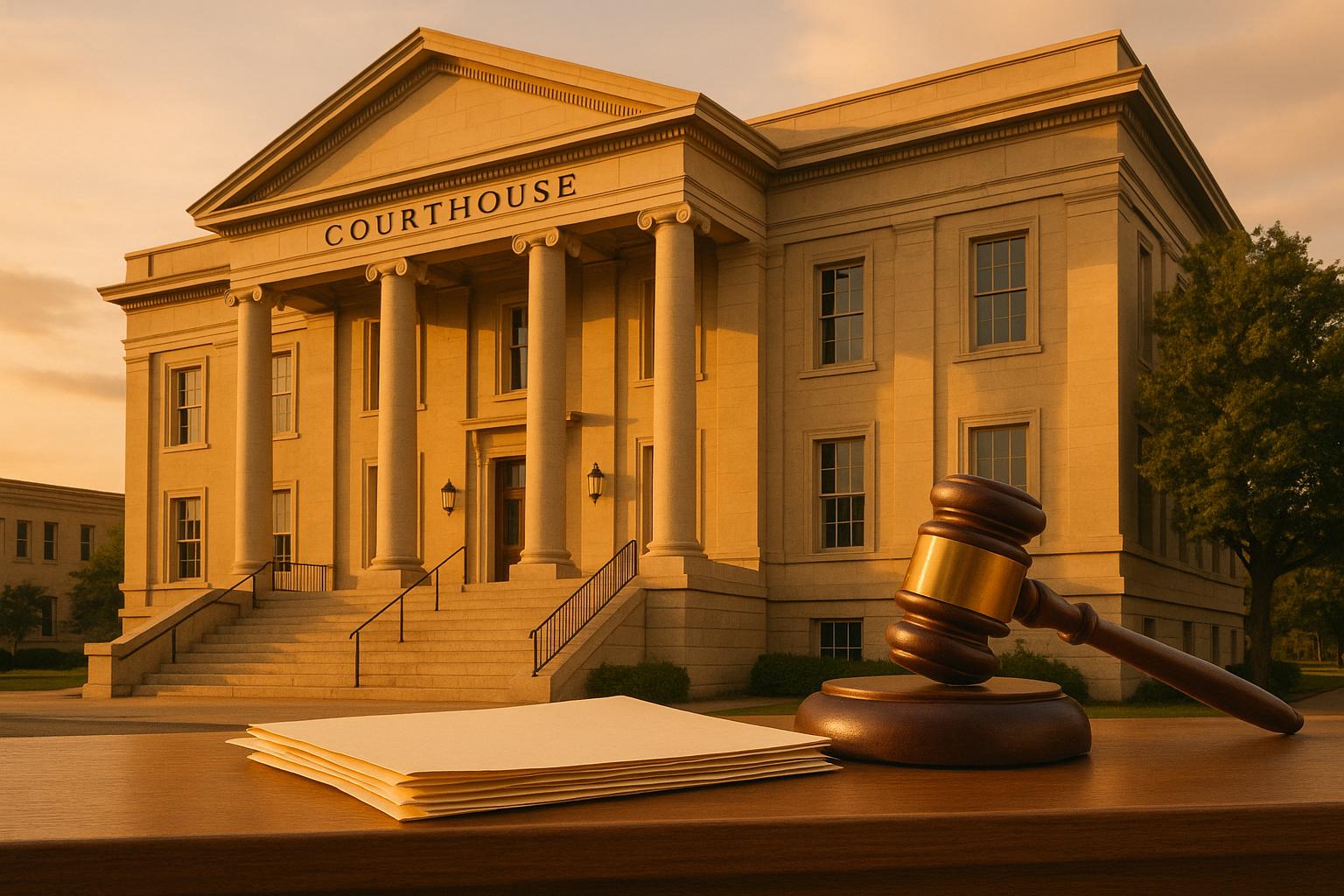If you have a bench warrant in South Carolina, it means law enforcement can arrest you at any time for not meeting court requirements, like missing a court date or failing to follow court orders. Ignoring it can lead to jail time, fines, and long-term legal issues. Here’s what you need to know:
- Why Bench Warrants Are Issued: Common reasons include missing court dates, not paying fines, or ignoring subpoenas.
- How to Check for a Warrant: Contact local law enforcement, search online court records, or ask a lawyer to confirm for you.
- What to Do If You Have One: Act quickly. Hire a criminal defense attorney, voluntarily appear in court, or negotiate a resolution.
Bench warrants don’t expire, and ignoring them can worsen your situation. Addressing it promptly with legal help can reduce penalties and avoid unexpected arrests.
If you want expert advice, call Delaney Law Firm today or fill out our contact form.
Why Courts Issue Bench Warrants
In South Carolina, courts issue bench warrants to ensure individuals comply with court orders. These warrants are often triggered by specific actions – or inactions – that require immediate attention to avoid further legal trouble.
Missing Your Court Date
One of the most common reasons for a bench warrant is missing a scheduled court appearance. When you’re summoned to court or given a specific date to appear, the expectation is clear: you must show up. Skipping that date signals noncompliance and can disrupt the judicial process.
To avoid this, make a habit of marking court dates on your calendar and setting reminders. If you know you won’t be able to attend, reach out to your attorney as soon as possible to address the situation.
Not Following Court Orders
Failing to comply with court orders – like paying fines, meeting probation requirements, or adhering to child support obligations – can also lead to a bench warrant. Courts issue these orders to be followed, and ignoring them can have serious consequences.
Take the time to thoroughly review any court orders you receive. If anything is unclear, consult with your attorney to ensure you understand your responsibilities.
Avoiding Legal Papers
Another trigger for a bench warrant is ignoring a subpoena. A subpoena is a legal mandate requiring you to appear in court, often as a witness or to provide testimony. If you evade being served or choose to ignore it, the court may issue a bench warrant to compel your appearance.
Failing to respond to a subpoena or court order can also lead to contempt charges. It’s important to remember that bench warrants are issued to enforce compliance, not as punishment for the underlying issue. Recognizing these triggers can help you address the situation promptly and avoid escalating legal challenges.
How to Find Out if You Have a Bench Warrant
If you think there might be a bench warrant issued in your name in South Carolina, there are several ways to confirm it. Each option comes with its own pros and cons, so choose the one that works best for your situation.
Call Local Police or Sheriff’s Office
One way to check is by contacting your local sheriff’s office or police department. These agencies maintain records of active warrants in their area and can let you know if your name is on the list. However, keep in mind that showing up in person could lead to an immediate arrest if a warrant exists. To avoid this risk, it’s generally safer to call instead of visiting. That said, even a phone inquiry could potentially alert law enforcement to your location, so proceed with caution.
Search Online Court Records
Another option is to search for court records online. Many South Carolina counties, like Charleston County and Richland County, provide online databases where you can look up active warrants using a person’s full name. Start by visiting your county’s public records section – warrant information is often available there at no cost. Some sheriff’s departments also maintain searchable databases for active warrants.
While online searches are convenient and private, they might not always be accurate or up to date. If you suspect a more serious issue, you can also check your county sheriff’s "most wanted" list, which is often publicly accessible. Be cautious about using third-party websites for warrant searches, as they may charge fees. Always verify any findings through official state or local sources.
Ask a Lawyer to Check for You
Consulting a criminal defense attorney is one of the safest and most reliable ways to confirm whether you have a bench warrant. An attorney can access the necessary records on your behalf without putting you at risk of immediate arrest.
As Kent Collins, a criminal defense lawyer, advises:
"If you suspect there is a bench warrant for your arrest, call your attorney immediately. If you don’t have an attorney, get a criminal defense lawyer on your case immediately."
- Kent Collins, Criminal Defense Lawyer
An attorney can not only verify the warrant but also help you plan your next steps. They might file a motion to lift the warrant or negotiate terms for a voluntary surrender, potentially leading to a better outcome. Keep in mind that law enforcement or the solicitor’s office might not provide full details about a warrant directly, as this helps prevent individuals from evading arrest. Since arrest warrants in South Carolina remain valid indefinitely, it’s critical to act quickly once you confirm a warrant exists. The sooner you address the issue, the better your chances of resolving it effectively.
How to Handle Your Bench Warrant
If you’ve confirmed there’s a bench warrant against you, it’s important to act swiftly. The steps you take next can influence how the court views your case and may affect potential penalties. Quick action can help you avoid additional legal trouble. Here’s how you can address the situation:
Hire a Criminal Defense Lawyer
The first thing you should do is hire a criminal defense attorney. An experienced lawyer can handle critical tasks like negotiating with the prosecutor, filing motions to lift the warrant, and representing you in court. They can also help reduce the chances of you spending time in custody, arrange a safe surrender, and ensure your rights are protected throughout the process.
Voluntarily Appear in Court
Another option is to go to court on your own. Voluntarily showing up demonstrates that you’re taking responsibility, which could positively impact how the court views your case. However, before you take this step, consult with an attorney. A lawyer can help you prepare for what to expect and make sure you’re taking the right steps to protect yourself.
Negotiate a Resolution
If financial or procedural issues are involved, resolving the warrant through negotiation might be the best path forward. With the help of an attorney, you could negotiate the terms of your bond, work out a payment plan for any fines owed, or even have the warrant dismissed altogether. Your lawyer can also explore alternative solutions, like adjusting community service requirements, to address the court’s concerns. Having legal guidance ensures that the resolution you reach is practical and doesn’t create more problems down the line.
Taking action quickly and with the right support can make all the difference in resolving a bench warrant effectively.
sbb-itb-ce0cbb0
What Happens if You Ignore a Bench Warrant
Ignoring a bench warrant can lead to escalating legal trouble and financial burdens. Once issued, a bench warrant demands immediate attention to avoid severe consequences.
Police Can Arrest You
A bench warrant gives law enforcement the authority to arrest you at any time. This includes routine interactions, like traffic stops or other casual encounters with police. The warrant remains active until it’s addressed, meaning there’s no expiration.
If arrested, you’ll likely be held in custody until you’re brought before a judge. Depending on the circumstances, this could mean immediate or short-term detention while awaiting your court appearance.
Increased Fines and Legal Complications
Failing to address a bench warrant doesn’t just end with an arrest – it can lead to additional charges and fines, further complicating your legal situation.
"Failure to appear’ when you have a court date scheduled in SC can have serious consequences, including a bench warrant for your arrest, the possibility of bond revocation, and additional criminal charges." – kentcollinslaw, Criminal Offenses
The financial penalties can be steep. For instance, under South Carolina Code § 17-15-90, failing to appear in court for a felony charge can result in fines up to $5,000 and up to five years in prison. If the original charge was a misdemeanor punishable by a year or more, you could face an additional year in prison just for not showing up.
Ignoring a bench warrant could also lead to contempt of court charges for disregarding a judge’s order. On top of that, you might have to deal with extra court costs and higher legal fees, as the added charges make your case more complex. These penalties can leave long-term marks on your criminal record, potentially affecting future opportunities. Acting quickly to resolve the warrant is crucial to avoid these escalating consequences.
Take Action on Your Bench Warrant Now
A bench warrant doesn’t just disappear over time – it remains active until addressed. The longer you wait, the greater the risk of being arrested unexpectedly. Law enforcement can execute the warrant at any time, whether it’s during a routine traffic stop, at your home, or even at your workplace.
To handle this situation effectively, it’s crucial to act quickly. Start by consulting a criminal defense attorney. They can evaluate your case, explain your legal options, and work with the court to arrange a voluntary appearance. This proactive approach often leads to better outcomes than being caught off guard by an arrest.
The sooner you take action, the better. Resolving the issue promptly with the help of an attorney can reduce penalties, limit jail time, and help you avoid mistakes that could make things worse.
Don’t wait until it’s too late. Reach out to a criminal defense attorney today to discuss your case and create a plan for resolving your bench warrant safely and efficiently.
FAQs
How can I find out if there’s a bench warrant issued against me in South Carolina?
If you think there might be a bench warrant issued against you in South Carolina, there are a few ways to find out for sure. Start by reaching out to the Clerk of Court in your county or contacting your local law enforcement agency. They can give you accurate, up-to-date information about any warrants. Another option is to check the official court records through the South Carolina Judicial Branch or other authorized state resources.
It’s best to steer clear of unofficial websites or third-party sources, as their information might be outdated or incorrect. If you do confirm that a warrant exists, it’s crucial to consult a criminal defense attorney right away. They can help you understand your options and guide you on how to handle the situation quickly and effectively.
Can a criminal defense attorney help resolve or reduce penalties for a bench warrant in South Carolina?
If you’re dealing with a bench warrant in South Carolina, hiring a criminal defense attorney could make a huge difference. A skilled attorney can navigate the legal system on your behalf, work with prosecutors, and help you address the warrant while aiming to reduce potential penalties.
Depending on the details of your case, they might explore options like plea agreements or alternative resolutions to lessen charges or penalties. Having an attorney by your side not only protects your rights but also improves your chances of reaching a favorable resolution.
What happens if you ignore a bench warrant in South Carolina?
Ignoring a bench warrant in South Carolina can lead to serious legal trouble. Police officers have the authority to arrest you at any time, often without warning. This could happen during a routine traffic stop, at your job, or even in the comfort of your own home.
If you don’t address the warrant, you could be found in contempt of court, which might result in fines or even jail time. The longer you let the situation go unresolved, the worse the consequences can become, potentially complicating any future legal issues. Acting quickly is key to reducing these risks.





